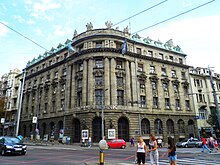The Adriatic-Danubian Bank (Serbo-Croatian: Jadransko-podunavska banka) was a significant commercial bank in the interwar Kingdom of Yugoslavia. At the time of the merger that formed it in 1924, it was the third-largest commercial bank in the country.[2]: 130 It was liquidated in 1945, together with the entire Yugoslav commercial banking sector.[3]

Background
editThe Adriatic Bank (Croatian: Jadranska banka) was founded in 1905 by a group of Slovene, Croatian and Serb individuals in Trieste, which at the time was part of Austria-Hungary.[4]: 135 [5] It soon developed a network of branches on the Dalmatian coast and dominated the region's banking market.[6]: 51 In 1911–1913, it acquired the Croatian Religious Bank (Croatian: Hrvatska vjeresijska banka, Italian: Banca Croata di Credito in Ragusa, est. 1902) in Dubrovnik,[7] and also took over the Commercial Bank (Croatian: Trgovačka obrtna banka) in Ljubljana.[8]
Separately, the Danubian Joint-Stock Company (Serbian: Podunavsko - Trgovačko Akcionarsko Društvo) was established in Belgrade in 1910 by the Serbian Bank in Zagreb as its affiliate in the Kingdom of Serbia.[9]
Following World War I, the Adriatic Bank's head office in Trieste and operations in Fiume, Abbazia, and Zara, as well as its branch in Vienna where it had relocated head office functions during the war, became an Italian bank (Italian: Banca Adriatica),[5] which eventually failed in 1924.[10]: 18 The bank's operations in the newly formed Kingdom of Serbs, Croats and Slovenes, initially managed from Ljubljana, were reorganized in 1921 by the same shareholders as Jadranska Banka a.d., headquartered in Belgrade.[2]: 173
Merger and aftermath
editOn 11 May 1924, the Belgrade-based Adriatic Bank and Danubian Joint-Stock Company merged to form the Adriatic-Danubian Bank.[11]: 37 Its first chairman was Vladimir Matijević, also head of the Serbian Bank in Zagreb.[11]: 41
At that time, it had branches in Bled, Cavtat, Celje, Dubrovnik, Herceg Novi, Jelsa, Korčula, Kotor, Kranj, Ljubljana, Maribor, Metković, Prevalje, Sarajevo, Split, Šibenik, and Zagreb.[2] The bank was severely impacted by the European banking crisis of 1931, however, after which it closed all branches except that in Kotor.[6]: 51 It further stagnated after Germany's invasion of Yugoslavia in 1941.[6]: 109
See also
editNotes
edit- ^ Hajna Tucić and Milan Prosen (2015), Alpha among Palaces: Adriatic-Danubian Bank, Belgrade: Alpha Bank Srbija
- ^ a b c Ljubomir Stefan Kosier (1924), "L'Épargne : Son organisation, son progrès, ses institutions chez les Serbes, Croates et Slovènes", Questions Balkaniques, Zagreb: Édition de l'Économiste Balkanique
- ^ Jouko J. Hauvonen (1970), Postwar Developments in Money and Banking in Yugoslavia (PDF), International Monetary Fund, p. 564
- ^ Mira Kolar-Dimitrijević (2018), The History of Money in Croatia 1527 – 1941, Zagreb: Croatian National Bank
- ^ a b "The Adriatic Bank, Ltd., of Belgrade, Jugoslavia" (PDF), The Commercial & Financial Chronicle, p. 927, 26 August 1922
- ^ a b c Federal Reserve Board (February 1944), Army Service Forces Manual M355-5 / Civil Affairs Handbook Yugoslavia: Money and Banking, Washington DC: U.S. Army Service Forces
- ^ Marija Benić Penava (2013), "Bankarsko poslovanje u dubrovačkom i bokokotorskom kotaru između dva svjetska rata (1918-1941)", Anali Zavoda Za Povijesne Znanosti Hrvatske Akademije Znanosti i Umjetnosti U Dubrovniku, 51/2
- ^ "Obavijesno pomagalo za stvaratelja "Jadranska banka - ispostava Split" 1906-1944" (PDF), Državni arhiv u Splitu
- ^ Branko Hinić, Milan Šojić, and Ljiljana Đurđević (2009), Monetary Conditions in the Kingdom of Serbia (1884-1914) (PDF), National Bank of Serbia, p. 20
{{citation}}: CS1 maint: multiple names: authors list (link) - ^ Mario Molteni & Dario Pellegrino (2022), "The establishment of banking supervision in Italy: an assessment (1926–1936)", Business History: 1–29, doi:10.1080/00076791.2022.2134347
- ^ a b Svetlana Pantelic (2009), "Jadransko Podunavska Banka" (PDF), Bankarstvo